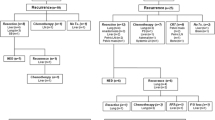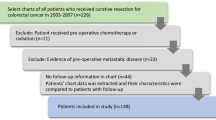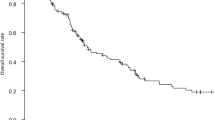Abstract
Objective
To provide the evidence of predicting and preventing the postoperative recurrence by investigating the relationship between the recurring types of colorectal carcinoma (CRC) after radical resection and clinicopathologic factors.
Methods
Data from 464 CRC patients in stage I–III, who were admitted to our hospital during a period from January 1998 to December 2002 and underwent radical surgery, were collected, and retrospective analysis of the clinicopathologic data from 90 out of the 464 CRC patients, who developed postoperative recurrence was conducted. The 90 patients were divided into 2 groups based on the recurrence time (RT). Those with a RT of ≤ 30 months were classified into the early recurrence (ER) group and those with RT of > 30 months were classified into late recurrence (LR) group. The χ 2 test was used for univariate analysis, and binomial logistic regression analysis for multivariate analysis.
Results
There were 78 patients (86%) in the ER group and 12 (14%) in the LR group. The median recurrence time (MRT) was 35.1 months, 13.6 months, and 12.9 months in CRC patients with stage-I, stage-II and stage-III, respectively. There were significant differences in RT among the groups (P = 0.001). In the 90 patients, the MRT was 17.4 months. The median time (MT) was 16.9 months in patients with regional recurrence, 13.3 months in patients with single recurrence, and 7.7 months in patients with multiple metastases. Univariate analysis indicated that the depth of tumor infiltration, the number of positive lymph nodes, and the macroscopic types of the primary tumor were the factors affecting the relapse of the tumor. The multivariate analysis revealed that the depth of tumor infiltration was the independent factor affecting the time of ER (P = 0.049).
Conclusion
Most of CRC patients receiving radical surgery for colorectal cancer occur recurrence within 30 months after the first operation, nevertheless, LR occurs in some CRC patients over 30 months after the surgery. The time interval varies in different types of recurrence. Distant metastasis is seen mainly in the cases with postoperative ER, and regional recurrence in the cases with LR. The depth of tumor infiltration is an independent predictor affecting the postoperative RT of CRC, and the tumor infiltration into, or beyond the seromembranous layer is considered as independent factor affecting the ER of CRC.
Similar content being viewed by others
Explore related subjects
Discover the latest articles and news from researchers in related subjects, suggested using machine learning.References
Jemal A, Siegel R, Ward E, et al. Cancer statistics, 2009. CA Cancer J Clin 2009; 59: 225–249.
Parkin DM, Bray F, Ferlay J, et al. Global Cancer Statistics, 2002. CA Cancer J Clin 2005; 55: 74–108.
Gill S, Loprinzi CL, Sargent DJ, et al. Pooled analysis of fluorouracil-based adjuvant therapy for stage II and III colon cancer: Who benefits and by how much? J Clin Oncol 2004; 22: 1797–1806.
Kobayashi H, Mochizuki H, Sugihara K, et al. Characteristics of recurrence and surveillance tools after curative resection for colorectal cancer: a multicenter study. Surgery 2007; 141: 67–75.
Walter EL, Frank EJ. The preoperative assessment and postoperative surveillance of patients with colon and rectal cancer. Surg Clin N Am 2002; 82: 1091–1108.
Kornprat P, Jarnagin WR, Gonen M, et al. Outcome after hepatectomy for multiple (four or more) colorectal metastases in the era of effective chemotherapy. Ann Surg Oncol 2007; 14: 1151–1160.
De Jong MC, Pulitano C, Ribero D, et al. Rates and patterns of recurrence following curative intent surgery for colorectal liver metastasis: an international multi-institutional analysis of 1669 patients. Ann Surg 2009; 250: 440–448.
Park JK, Kim YW, Hur H, et al. Prognostic factors affecting oncologic outcomes in patients with locally recurrent rectal cancer: impact of patterns of pelvic recurrence on curative resection. Langenbecks Arch Surg 2009; 394: 71–77.
Miller G, Biernacki P, Kemeny NE, et al. Outcomes after resection of synchronous or metachronous hepatic and pulmonary colorectal metastases. J Am Coll Sur 2007; 205: 231–238.
Kobayashi H, Mochizuki H, Morita T, et al. Timing of relapse and outcome after curative resection for colorectal cancer: a Japanese multicenter study. Dig Surg 2009; 26: 249–255.
Michael JO, Megan EC, Richard MG, et al. Survival following recurrence in stage II and III colon cancer: Findings from the ACCENT data set. J Clin Oncol 2008; 26: 2336–2341.
De Gramont A, Hubbard J, Shi Q, et al. Association between disease-free survival and overall survival when survival is prolonged after recurrence in patients receiving cytotoxic adjuvant therapy for olon cancer: simulations based on the 20,800 patient ACCENT data set. J Clin Oncol 2010 Jan 20; 28: 460–465.
Kaiser AM, Kang JC, Chan LS, et al. The prognostic impact of the time interval to recurrence for the mortality in recurrent colorectal cancer. Colorectal Dis 2006; 8: 696–703.
Weiser MR, Bowne WB, Lee B, et al. Operative salvage for locoregional recurrent colon cancer after curative resection: an analysis of 100 cases. Dis Colon Rectum. 2005; 48: 897–909.
Takahashi S, Konishi M, Nakagohri T, et al. Short Time to Recurrence After Hepatic Resection Correlates with Poor Prognosis in Colorectal Hepatic Metastasis. Jpn J Clin Oncol 2006; 36: 368–375.
Chmielarz A, Kryj M, Wloch J, et al. Prognostic factors for the time of occurrence and dynamics of distant metastases and local recurrences after radical treatment in patients with rectal cancer. Med Sci Monit 2001;7: 1263–1269.
Tsai HL, Chu KS, Huang YH, et al. Predictive factors of early relapse in UICC stage I-III colorectal cancer patients after curative resection. J Surg Oncol 2009; 100: 736–743.
Fujita S, Shimoda T, Yoshimura K, et al. Prospective evaluation of prognostic factors in patients with colorectal cancer undergoing curative resection. J Surg Oncol 2003; 84:127–131.
Tsai HL, Cheng KI, Lu CY, et al. Prognostic significance of depth of invasion, vascular invasion and numbers of lymph node retrievals in combination for patients with stage II colorectal cancer undergoing radical resection. J Surg Oncol 2008; 97: 383–387.
Greene FL, Stewart AK, Norton HJ. A new TNM staging strategy for node-positive (stage III) colon cancer: an analysis of 50,042 patients. Ann Surg 2002; 236: 416–421.
Liang JL, Wan DS, Pan ZZ, et al. Multivariate regression analysis of recurrence following curative surgery for colorectal cancer. Ai Zheng 2004; 23: 564–567 (Chinese).
Yonenaga Y, Mori A, Onodera H, et al. Absence of smooth muscle actin-positive pericyte coverage of tumor vessels correlates with hematogenous metastasis and prognosis of colorectal cancer patients. Oncology 2005; 69: 159–166.
Easton DM. Gompertzian growth and decay: a powerful descriptive tool for neuroscience. Physiol Behav 2005; 86: 407–414.
Norton L, Simon R. The Norton-Simon hypothesis: designing more effective and less toxic chemotherapeutic regimens. Nat Clin Pract Oncol 2006; 3: 406–407.
Ni PY, Qu HT. Analysis about data of operation and colonscopic follow-up of 125 colon cancer cases. Zhongguo Neijing Zazhi 2002; 8: 26–28 (Chinese).
McFall MR, Woods WG, Miles WF, et al. Colonoscopic surveillance after curative colorectal resection: results of an empirical surveillance programme. Colorectal Dis 2003; 5: 233–240.
Rex DK, Kahi CJ, Levin B, et al. Guidelines for colonoscopy surveillance after cancer resection: a consensus update by the American Cancer Society and US Multi-Society Task Force on Colorectal Cancer. Gastroenterology 2006; 130: 1865–1871.
Sardi A, Minton JP, Nieroda C, et al. Multiple reoperations in recurrent colorectal carcinoma. An analysis of morbidity, mortality, and survival. Cancer 1988; 61: 1913–1919.
Guyot F, Faivre J, Manfredi S, et al. Time trends in the treatment and survival of recurrences from colorectal cancer. Ann Oncol 2005; 16: 756–761.
Prochotsky A, Okolicany R, Sekac J, et al. Diagnosis and management of local and locoregional recurrence of colorectal carcinoma. Bratisl Lek Listy 2009; 110: 569–573.
Author information
Authors and Affiliations
Corresponding author
About this article
Cite this article
Su, Bb., Shu, H. & Wan, J. Cross analysis of recurrent types after radical resection of colorectal carcinoma. Clin. Oncol. Cancer Res. 7, 146–150 (2010). https://doi.org/10.1007/s11805-010-0510-3
Received:
Accepted:
Published:
Issue Date:
DOI: https://doi.org/10.1007/s11805-010-0510-3




